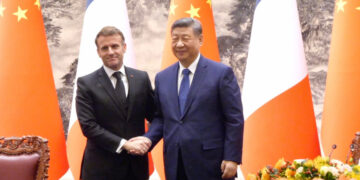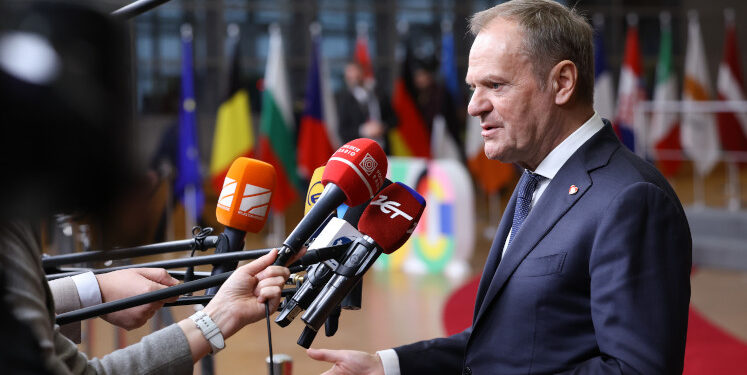Donald Trump’s presidency has prompted questions about whether Europe should develop its own nuclear deterrent. John Ryan argues that while there are strong reasons for Europe to cooperate more closely on defence, it is unrealistic to think French and British weapons could credibly protect Europe.
Trust in the US under Trump has been severely damaged internationally to a point where even the return of a sensible administration in Washington will not restore it. This will cost everyone, the US included.
Who in Europe will buy US weapons that the US can switch off remotely on a whim? Who in Europe will instinctively support global US policy? These are some of the unintended consequences which may not be what the US was aiming for.
Meanwhile, too many politicians in Germany keep saying that they are ready to lead Europe, but the reality is that the German military leadership and armed forces are ill equipped and lack the trust of other countries to do so. Against this backdrop, it is perhaps unsurprising that Poland has expressed interest in acquiring access to nuclear arms.
Europe’s nuclear problem
The delivery of Taurus cruise missiles by the Bundeswehr to Ukraine was consistently rejected by Chancellor Olaf Scholz. However, his successor, Friedrich Merz, has publicly endorsed it and indicated he is also open for discussions on nuclear deterrence in Europe.
The difficulty with nuclear defence in Europe is that the bombs of the French and British military are too big. These weapons are intended to deter existentially dangerous attacks on their own country in extreme emergencies by threatening a crushing retaliation. Anyone who uses such powerful weapons to protect allies must expect a counterattack on their own capital.
The deterrence that France and the UK could provide for their partners in its current form is therefore not realistic. France is to reopen a fourth nuclear air base near Germany as Europe rushes to rearm. But realistically, Europe needs “tactical”, i.e. smaller nuclear weapons, if it wants joint deterrence.
While France’s nuclear force is entirely independent, the UK relies in part on the United States for the maintenance of its missiles and elements of the nuclear warheads. Since 1958, the United States and the United Kingdom have had a Mutual Defence Agreement which governs cooperation on nuclear weapons. It has been amended and extended ten times and on 14 November 2024 was extended indefinitely.
Could French nuclear weapons protect Europe?
France must convincingly explain its nuclear deterrence posture – its “dissuasion” doctrine – as both distinct from, and complementary to, the US nuclear umbrella. Rooted in the Gaullist concept of an independent “force de frappe”, the French model emphasises “dissuasion du faible au fort” (“deterrence from the weak to the strong”) and allows for political flexibility in its application, including possible first-strike authority.
In his 5 March 2025 address, President Emmanuel Macron broadened the discourse by initiating a strategic dialogue on extending the protective value of French deterrence to European allies – while retaining presidential sovereignty over nuclear decisions. This represents a nuanced innovation: offering greater transparency without shifting control, thereby reframing deterrence as an instrument of collective European security rather than unilateral French power.
France’s surging defence ambitions are, however, impeded by structural budgetary limitations. While Macron’s government has pledged not to raise taxes to fund increased defence expenditures, the financial leeway appears narrow, effectively pointing to reliance on debt or budget reallocation – a model questionable in terms of long-term sustainability.
France’s military programming law outlines a plan to elevate defence spending significantly by €413 billion through 2030, a roughly 40% increase over the prior cycle. This is aimed at modernising nuclear forces, cyber-capabilities and high-technology systems. Still, economic analysis underscores that Europe overall will require additional fiscal leeway – either via long-term debt, tax increases or cuts to civilian spending – to meet higher defence spending benchmarks.
The interplay between defence ambitions and electoral politics constitutes a further challenge. Macron’s pledge to avoid new taxes for increased military funding aims to limit domestic backlash, but it may fall short, potentially triggering public discontent, social unrest, and electoral gains for the populist National Rally. A National Rally victory in future elections would not only jeopardise strategic autonomy but also cast Macron’s tenure as aiding their rise – an outcome with profound implications for European policy coherence.
Can Germany rely on France?
Government spending on defence weapons aside, conscription will still be a huge issue for the German government. The tendency is in the direction of wanting to lean on the French military while Trump’s US is in the process of becoming an autocratic system. However, replacing US support with reliance on France carries its own risks.
The likelihood of a National Rally President at the next French election is real and may lead to uncertain ideas on governance. Merz will have to work with the UK, France and Poland to create a new reliable European core for defence and a European defence industry. After the inertia of the Merkel/Scholz years, at least Merz is trying to address the problem of German security and economic decline.
Europe’s ability to address its nuclear conundrum will ultimately decide the fate of European Strategic Autonomy. This will be determined less by the strength of its rhetoric than by Europe’s ability to generate the political will and material resources necessary to act strategically in a world of intensifying geopolitical rivalry.
Note: This article gives the views of the author, not the position of EUROPP – European Politics and Policy or the London School of Economics. Featured image credit: European Union






































Discussion about this post